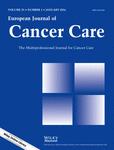Cancer patient experience with navigation service in an urban hospital setting: a qualitative study
Abstract
Cancer patient navigators are increasingly present on the oncology health care team. The positive impact of navigation on cancer care is recognised, yet a clear understanding of what the patient navigator does and how he/she executes the role continues to emerge. This study aimed to understand cancer patients’ perceptions of, and experiences with patient navigation, exploring how navigation may enhance the patient experience in an urban hospital setting where patients with varying needs are treated. A qualitative study using a constructionist approach was conducted. Fifteen colorectal cancer patients participated in semi-structured telephone interviews. Data were analyzed inductively and iteratively. Findings provide insight into two central aspects of cancer navigation: navigation as patient-centred coordination and explanation of clinical care, and navigation as individualised, holistic support. Within these themes, the key benefits of navigation from the patients’ perspective were demystifying the system; ensuring comprehension, managing expectations; and, delivering patient-centred care. The navigator provided individualised and extended family support; a holistic approach; and, addressed emotional and psychological needs. These findings provide a means to operationalise and validate an emerging role description and competency framework for the cancer navigator who must identify and adapt to patients’ varying needs throughout the cancer care continuum.




